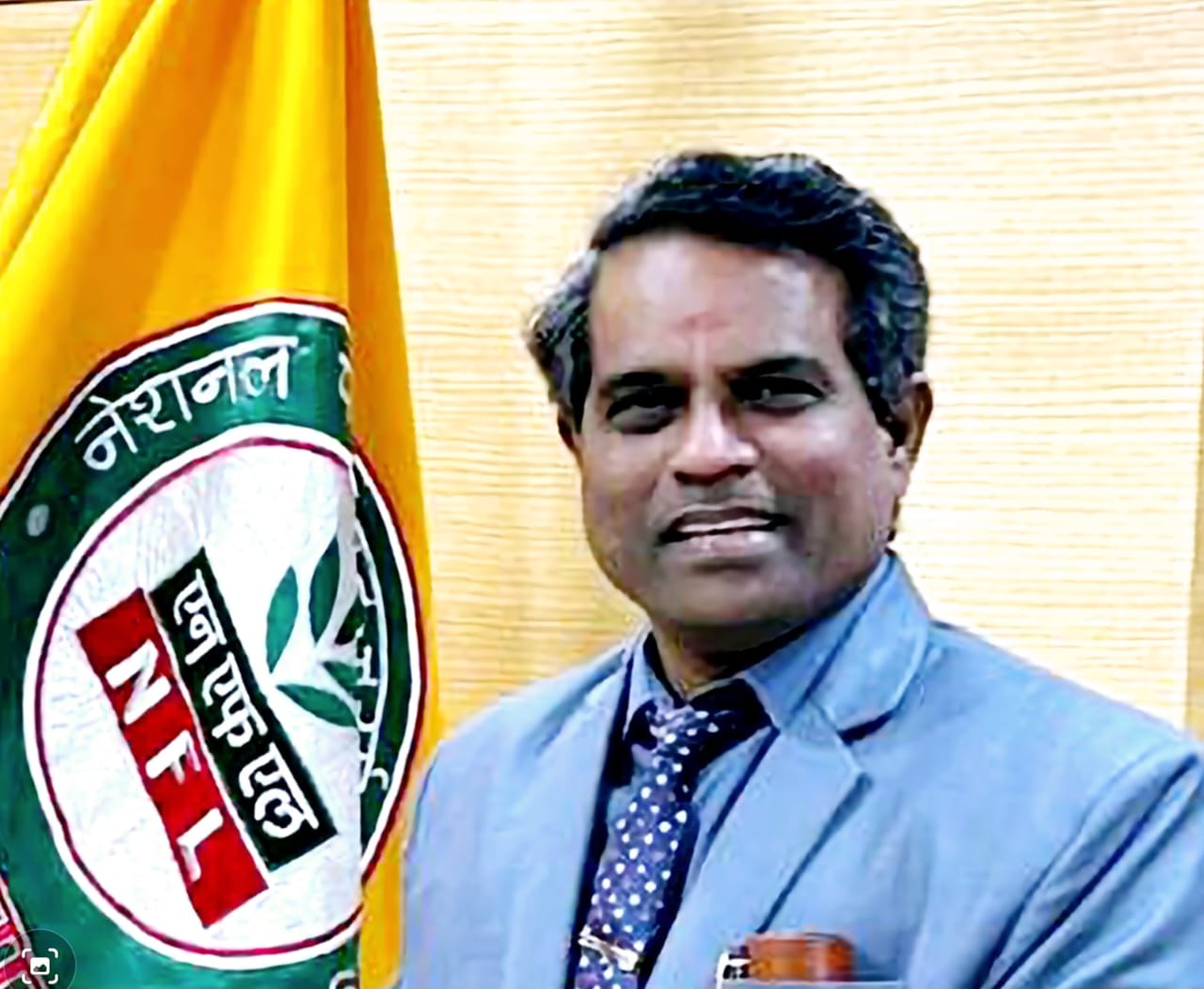NFL will soon go global & also diversify our product portfolio: U Saravanan, CMD, National Fertilizers Limited
Author: Navneet Anand & Pragya Lal

U Saravanan, as the Chairman & Managing Director of National Fertilizers Limited (NFL), a Navratna company, has a rich 33 + years of industry expertise, having spent time in oil refinery, chemicals, and fertilizers. Prior to his current role, he also served as CMD of Madras Fertilizers Limited. A chemical engineer by training, Saravanan is passionate about what he does and is an ardent advocate of Atma Nirbhar Bharat. An exceedingly inspiring leader, he leads from the front and can often be found in the field.
In an exclusive interview with the Editor-in-Chief of Bureaucrats India, Dr Navneet Anand, and Pragya Lal, Saravanan shares his vision and aspirations for NFL, shedding light on the company's journey, its critical role in India's self-sufficiency narrative, and its innovative strides towards eco-friendly alternatives.
How has NFL contributed to India's goal of achieving self-sufficiency in urea production, particularly in light of the increased domestic output of nano urea?
NFL produces close to 40 lakh metric tons of urea, contributing about 14% of the total production nationwide. When considering all types of fertilizers, our contribution rises to over 57%. In terms of national production, we rank second only to IFFCO, highlighting NFL's significant role in meeting the country's urea self-sustainability goals.
Regarding nano fertilizers, the government currently imports around 6 to 7 million tons of urea, down from over 10 million tons previously. The introduction of nano fertilizers aims to reduce these imports and meet domestic demand. Nano fertilizer production in India doesn't rely on subsidies, aligning with our urea production business. In fact, we are planning to venture into nano fertilizer production soon.
Could you elaborate on the NFL's initiative towards adopting eco-friendly alternatives and their impact on reducing urea imports?
NFL trades city compost, produces biofertilizers, and recently launched a product called fermented organic menu. We also trade in SSP (Single Super Phosphate) and are exploring alternatives like potash derived from molasses, a byproduct of the sugar industry. Our continuous endeavor is to reduce chemical fertilizer usage. While these alternatives may not entirely replace imports immediately, they contribute to reducing dependency gradually.
With the decline in consumption of conventional urea and the rise in sales of nano urea, how has NFL adapted its production and marketing strategies to meet changing market demands?
The advent of nano urea proves advantageous for both the NFL and the nation. NFL is initiating nano fertilizer production, targeting an output of approximately 5 crore bottles annually, equivalent to 22 lakh metric tons of urea. Nano urea's liquid form enhances nutrient efficiency and slashes transportation expenses compared to solid urea. NFL intends to progressively shift from solid to liquid urea production, with nano urea poised to fulfill import needs and eventually supplant solid urea entirely. This transition aligns with the government's food security objectives and alleviates subsidy burdens.
What specific measures has NFL taken to enhance energy efficiency and reduce carbon footprints across its manufacturing units?
Energy efficiency is crucial in our operations, especially in the production of urea, which is tightly regulated. We focus on the specific consumption of raw materials, optimising the amount used to produce the same quantity of urea. Previously, we used fuel oil which resulted in higher carbon residues and more carbon dioxide emissions. Now, we've transitioned to using regasified liquefied natural gas (RLNG), which significantly reduces the volume of carbon dioxide produced. We only generate the amount of carbon dioxide necessary for our urea production, minimising excess.
Additionally, we've implemented gas turbine generators (GTG) with a heat recovery system. This setup not only generates power but also utilises the excess heat for steam production. This shift has allowed us to decrease our reliance on fuel oil, which was traditionally used for steam generation and other processes.
Overall, across our five units—two in Punjab, one in Haryana, and two in Madhya Pradesh—we have significantly reduced carbon emissions. This transformation shows our commitment to sustainable manufacturing practices and reducing our environmental impact.
NFL, on a well-deserved upward trajectory in the fertilizer sector, has been featured in Bureaucrats India's list of Top 23 Stars in Indian CPSEs: Embracing Innovations and New Ideas
How does the NFL plan to leverage its marketing network and distribution channels to expand its product offering beyond fertilizers and into other agro inputs?
NFL manufactures around 40 lakh metric tons of urea and markets an additional 10 to 11 lakh tons produced by the Ramagundam unit. We also engage in significant trading, resulting in a total distribution of about 60 lakh metric tons of urea annually. With this volume, we manage to distribute 10 to 13 crore bags of fertilizer each year, establishing that roughly every fifth or sixth bag sold in India is from NFL. This is the rough estimate of our extensive reach across the country.
In our efforts to expand further, we are looking towards new markets, enhancing our connection with farmers and entrepreneurs. Many of these entrepreneurs have innovative products catering to specific crops, aimed at improving soil fertility and crop yields. We see a great opportunity to collaborate with these innovators.
Our plan is to open up our marketing network to these entrepreneurs, allowing them to launch and sell their products under our brand, Kisan. This approach not only helps them reach a broader market but also benefits farmers by improving their soil's fertility and crop yields, which in turn enhances their income. Additionally, this strategy supports the government's 'Make in India' initiative.
Could you elaborate on NFL's initiatives in corporate social responsibility, particularly in sectors such as health, education, and environmental sustainability?
Under our CSR initiatives, NFL is deeply involved in various activities aimed at promoting health, education, and environmental sustainability. In the health sector, we supply medical equipment and ambulances to hospitals. We also organise medical health camps and screening tests for the early detection of cancer, with a focus on initiating early treatment, especially among women. Additionally, we provide hearing aids to individuals with hearing impairments and artificial limbs to differently abled persons.
In terms of education, NFL contributes by distributing educational materials, interactive boards, and water facilities to schools. We have also established mini science labs to promote STEM education—Science, Technology, Engineering, and Mathematics. Furthermore, we offer vocational training to women in the apparel sector to help them secure a livelihood.
Regarding environmental sustainability, in the villages near our manufacturing units, we have implemented several initiatives such as installing LED streetlights to reduce energy consumption. These efforts collectively reflect our commitment to supporting and improving the communities where we operate.
What are the future plans of the NFL to fulfill its vision and mission?
NFL is primarily engaged in the manufacture of urea, but looking ahead, solely relying on urea production may not be sufficient for our sustainability. Recognising the import-dependent nature of the sector, and the significant role that NFL as a Navratna PSU plays, we are planning to expand our operations globally. This includes acquiring reserves of raw materials such as rock phosphate and establishing joint ventures or fully owning production units abroad. Such steps will help us meet the domestic demand for DAP and SSP more effectively and reduce the outflow of subsidies abroad, keeping more financial resources within India.
Furthermore, by establishing a presence in the global market, we aim to stabilise prices at an affordable level. NFL operates on a principle of minimal profit margins, focusing instead on fulfilling its mission without a significant emphasis on profit-making. This approach will also help in controlling and reducing subsidy outgo.
Another key aspect of our future strategy involves diversifying our product range. We plan to introduce a variety of non-subsidised chemicals and fertilizers across India. This will provide better products to farmers, enhancing their productivity and income.
Tell us a bit about your family and personal interests?
If I hadn't entered this industry, I would have pursued a career in the film industry. I tried to get opportunities there, but when that didn’t work out, I focused on my current path and worked my way up to where I am today. For relaxation, I am passionate about music—I enjoy listening to songs and singing, and I'm also fond of watching movies and engaging in movie-related activities.
My wife is a homemaker. We have two children. My eldest daughter is pursuing her postgraduate degree in computer science, in Seoul, South Korea. My son is studying artificial intelligence and machine learning in Chennai.
Message for Bureaucrats India and its readers?
I have noticed Bureaucrats India's diligent efforts in identifying and showcasing leaders and bureaucrats who significantly contribute to our nation. I wish you all continued success in your endeavors.



